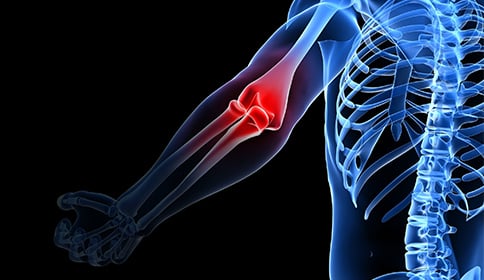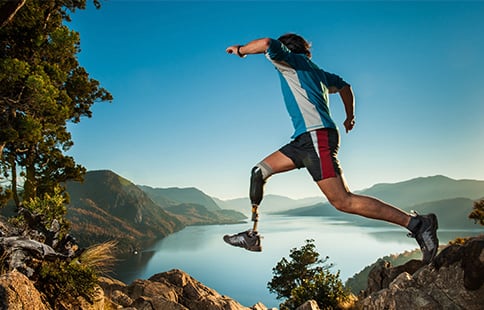Phantom limb pain is a very odd phenomenon. It occurs when a limb that has been amputated or otherwise lost still feels like it is attached to the body – and more often than not, the sensation is excruciating.
So what causes it, and how can you deal with it? Read on to find out!
Where Does the Sensation Come From?
Many scientists believe that the sensation of a phantom limb comes from residual activity in the parts of the Body Image Neuromatrix that were formerly dedicated to that limb. For this reason, treatments for phantom limb pain in the future may involve brain remapping techniques, which could help the brain let go of the lost limb.
Whenever a person experiences a major change in their body, there are corresponding changes in the brain that can also be observed. Additionally, when different, specific areas of the brain incur damage, there is a drastic change in body image and perception. This suggests that the brain and the body are connected in a complex, interactive way, instead of just one localized part of the brain being responsible for one localized part of the body.
What Is the Body Image Neuromatrix?
It is believed that the Body Image Neuromatrix is made up of four parts: regions of the parietal lobe, the somatosensory cortex, and two neural pathways. It seems to be developed in the first eight years of life, as evidenced by the low occurrence of phantom limb pain in children.
Previously, scientists thought that once the Neuromatrix was formed, it could not be changed. This meant that treatment for phantom limb pain involved things like prescription drugs, electric spinal cord stimulation, and acupuncture – all with minimal success. But now, thanks to studies that show how sensory input activates nearby areas of the Penfield map of the motor cortex after the amputation of a limb, it’s thought that the brain is somewhat flexible. That means the Neuromatrix could potentially be reconfigured.
Treatment for Phantom Limb Pain in the Future
With this new knowledge of how the Neuromatrix works, doctors and scientists can focus more on treating the brain rather than the body in order to get rid of phantom limb pain. Once we know exactly how malleable the Neuromatrix is, and once we understand exactly how to change it in order to bring relief to amputees, then we’ll be well on our way to effective treatment for phantom limb pain.
If you have questions about phantom limb pain or any other part of limb loss, contact us today. We are always here to help!
For a child, the beginning of a new school year typically brings a mixture of excitement and anxiety. What will the teacher be like? Who will be in their class? What will they learn?
These unknowns are challenging enough on their own, but if your child is starting their first school year with a prosthesis, they may need some extra help and support from you. Read on to learn how both of you can handle the situation gracefully and have a fantastic year at school!
Anticipate Lots of Questions
Especially if your child is very young, they are guaranteed to be on the receiving end of a million different questions when they walk into their new classroom. With possible inquiries like, “What is that?” or, “What happened to you?” it’s best to be prepared with short, clear answers that will satisfy the querier without encouraging follow-up questions.
These answers will vary according to each situation, of course, but if you can practice responding to questions with your child before the first day of school, it will make the transition much easier because they will know, more or less, what to expect from their classmates. Kids with prosthetic devices in school are going to attract attention from their peers, so the more prepared your child is, the better they will handle it.
Speak with the Teacher Beforehand
Your child’s biggest advocate will be (or should be, at least) his teacher. Be sure that you have a conversation with the teacher before school starts. Explain the reason for your child’s limb loss, what kind of prosthesis he has, how he is adjusting to it, and any special accommodations he will need.
This is also a good time to ask the teacher to report any bullying to you immediately. While most kids will (hopefully) be tactful, there will likely be others who are not. If your child is the victim of verbal abuse, physical abuse, or any other kind of bullying, you have a right to know about it and to address it with the bully and his/her parents. Your child’s teacher should be able to alert you to any red flags in that area.
Speak with Other Parents
Depending on what kind of response you anticipate from the other students, or what kind of response your child gets during the first week of school, it may be appropriate to reach out to other classroom parents.
This conversation would look very similar to the one you had with your child’s teacher, but you would also want to encourage them to be proactive in shutting down any demeaning talk about your child that they may hear from their own children. (Most parents would do this anyway, but it never hurts to personally encourage them to be on the lookout for inappropriate talk or behavior.)
Reassure Your Child
Most importantly, let your child know that you are here for them! Kids with prosthetic devices in school may feel insecure, scared, or bitter for a multitude of reasons. They need to know that you are in their corner, and that things will get easier every day. The more you can communicate that, the better your child will feel -- and the less it will matter what others say or do.
BioTech Is Here to Help!
When it comes to pediatric prosthetic services, BioTech Limb and Brace is ready and willing to do whatever it takes to give your child the fullest life possible. We are here to guide you every step of the way, from getting your child’s prosthesis fitted to learning how to use it in school. Contact us today!
Many people struggle with getting a good night’s sleep. Sometimes it’s financial worries, stress at work, illness, or children with a tendency to wake in the night. But getting sleep after limb loss can present a whole new set of complications! Let’s take a look at a few of the reasons you may not be sleeping well, plus some ways to catch more zzz’s at night!
Reason #1: Infrequent Stretching
It may seem tedious, but stretching on a daily basis will ensure that you can straighten your hip, leg, arms, etc. properly, which will make everything from sitting to walking to lying down more comfortable.
When your body is stiff and tight, it can’t relax the way it should once you climb in bed. This means a poor night of sleep for you and a hard time waking up the next morning!
Reason #2: Swelling
Your residual limb can start swelling the moment you let it hang off the bed in the morning, which means putting on your prosthesis won’t be easy. To combat this, put your prosthesis on before you swing your leg over the edge of the mattress or before you get up and start moving your arm.
This may be difficult to do, but as time goes on, the swelling will be less of an issue and this won’t be such an important step.
Reason #3: Morning Showers
Many people love a hot shower first thing in the morning, but unfortunately, hot water can cause your residual limb to swell.
Instead, try taking your shower at night so that your limb will be back to normal by the time you wake up. It might not be quite as satisfying to start your day without that hot shower, but your prosthesis will fit a lot better -- and that should make up for it!
BioTech Is Here for Your Questions About Sleep After Limb Loss!
Whether you have questions about your sleeping patterns or you’re curious about the fit of your prosthesis, BioTech is here to help you venture into your new life with joy and confidence! Contact us today!
Did you know that over 500 Americans lose a limb every day? It’s true! There are nearly 2 million people living with limb loss in the United States. With numbers like that, it’s obvious that if you’ve lost a limb and you’re looking for new amputee information, you’re certainly not alone! Ready to find out a few of the ways this month is special for people with limb loss? Let’s take a look!
“Show Your Mettle” Day
The Amputee Coalition's Show Your Mettle Day is scheduled for Saturday, April 23. The hope is that people with limb loss will wear and show their devices with pride on this day. The concept behind it all is to show your “mettle” (your capacity to deal with challenges and face a difficult situation with determination and resiliency) by showing your “metal” (your prosthesis or wheelchair).
Additionally, all who feel comfortable doing so are encouraged to post a photo of themselves wearing their device or using their wheelchair with the hashtag #ShowYourMettle throughout the month of April. These photos should be posted on The Amputee Coalition’s social media platforms – Facebook (Facebook.com/AmputeeUSA), Instagram (Instagram.com/AmputeeCoalition), and Twitter (Twitter.com/AmputeesUSA).
Other Things Happening This Month
Aside from specific events like the above, April is a special month for people with limb loss because of the focus on things like the following:
- Education for the limb loss community, including new amputee information
- A platform for those with limb loss to speak publicly about issues they face
- Prevention information for people who are at risk for limb loss
- Support for individuals with limb loss and their caregivers
Additionally, there are numerous local events like walk/run/roll 5Ks, fundraising festivals, and other exciting things happening all around the country. Check with your town to see what kind of opportunities you’ll have to celebrate the limb loss community this month!
BioTech Limb and Brace Has New Amputee Information for You!
Limb Loss Awareness Month is an amazing time for many reasons, but we like to celebrate our patients every day of the year! If you’re new to limb loss, contact us today for expert information and passionate professionalism. We are here to help you every step of the way!



